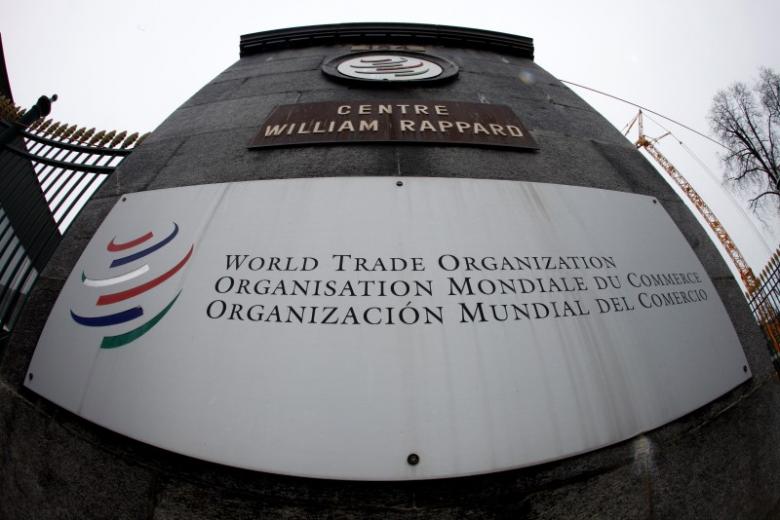
A World Trade Organisation (WTO) panel has suggested that Pakistan withdraw the anti-dumping measures imposed on imports of biaxially oriented polypropylene (BOPP) film from the United Arab Emirates, but declined to recommend refund of duties already paid.
The suggestion comes as the UAE approached the WTO panel, asking it to suggest that Pakistan "terminate the duties imposed" and "refund the anti-dumping duties collected".
The panel recommended that Pakistan bring its measures into conformity with its obligations under the Anti-Dumping Agreement, and suggested that Pakistan do so by withdrawing the anti-dumping measures it assessed on imports of BOPP film.
According to the WTO documents available with The Express Tribune, “This dispute concerns a challenge to successive anti-dumping duty measures that Pakistan adopted on imports of BOPP film from, among other sources, the UAE.
“The UAE challenged, first, a final anti-dumping duty determination dated April 9, 2015 that assessed anti-dumping duties on imports of BOPP film from the UAE until August 2015; this final determination of April 9, 2015 ratified a final determination of February 2013, which had been set aside following domestic court proceedings.
“Second, the UAE challenged a sunset review determination of December 1, 2016, which extended the anti-dumping duties for five years.”
It added, “Because of the fundamental nature and pervasiveness of the inconsistencies we have found, we suggest that Pakistan implement our recommendation by withdrawing the anti-dumping measures it has imposed on BOPP film from the United Arab Emirates.
“We decline however to suggest that Pakistan refund the anti-dumping duties already paid.”
It said, “In the case before us, we have found fundamental and pervasive inconsistencies, extending to the evidence on the basis of which the authority initiated the investigation, the chosen POI [period of investigation] for the original investigation, multiple aspects of the determination of injury in the original investigation, and multiple aspects of the sunset determination.”
Timeline
On January 24, 2018, the UAE requested consultations with Pakistan concerning latter’s anti-dumping measures on imports of BOPP film from the former.
The UAE claimed that the measures appear to be inconsistent with several articles and Annex II of the Anti-Dumping Agreement; Articles VI:1 and VI:2 of the GATT 1994.
On May 15, 2018, the UAE requested the establishment of a panel. At its meeting on May 28, 2018, the Dispute Settlement Body (DSB) deferred the establishment of a panel.
At its meeting on October 29, 2018, the DSB established a panel.
Afghanistan, China, the European Union, Japan, the Russian Federation, Saudi Arabia, and the United States reserved their third-party rights.
On November 14, 2018, Oman reserved its third-party rights.
Following agreement of the parties, the panel was composed on May 7, 2019.
On October 23, 2019, the chair of the panel informed the DSB that the beginning of the panel's work had been delayed as a result of a lack of availability of experienced lawyers in the Secretariat. The chair's communication indicated that the panel did not expect to issue its final report to the parties before the second half of 2020.
On January 18, 2021, the panel report was circulated to members.
Findings
The panel found that the final determination of April 9, 2015 is inconsistent with: Article 5.3 of the Anti-Dumping Agreement because, by initiating the investigation on the basis of evidence that was several years old without explaining why it was appropriate to do so or seeking to obtain more recent evidence, Pakistan did not assure itself that there was sufficient evidence to justify the initiation;
Articles 2.1 and 3.1 of the Anti-Dumping Agreement because, by basing its determination of dumping and injury on evidence that was 22 months old at the time of initiation and 31 months old at the time of the determination of 2013, without explaining this choice, without attempting to update the evidence, and without establishing that it was not possible to update the evidence, Pakistan made a determination of dumping without evidence of current dumping, and made a determination of injury without evidence of current injury;
Articles 3.1 and 3.2 of the Anti-Dumping Agreement, because Pakistan did not objectively consider whether the volume of dumped imports in absolute terms and relative to domestic production had increased significantly, and whether the effect of the dumped imports on prices of the like product had been significant price undercutting and significant price depression;
Articles 3.1 and 3.4 of the Anti-Dumping Agreement, because Pakistan did not evaluate all the injury factors listed in Article 3.4, and did not objectively evaluate the impact of the dumped imports on the state of the domestic industry; and
Articles 3.1 and 3.5 of the Anti-Dumping Agreement, because Pakistan based its causation analysis on findings that were inconsistent with Articles 3.1, 3.2 and 3.4, and did not ensure that injury caused by other known factors was not attributed to the dumped imports.
The Panel found that the UAE did not establish that the final determination of April 9, 2015 is inconsistent with:
Articles 2.2, 2.2.1, 2.2.1.1, and 2.2.2 of the Anti-Dumping Agreement with regard to the cost data relied upon to determine whether sales were in the ordinary course of trade; Article 2.4 of the Anti-Dumping Agreement with regard to the denial of an adjustment for level of trade; Article 5.10 of the Anti-Dumping Agreement with regard to the duration of the original investigation; and Article 6.2 of the Anti-Dumping Agreement with regard to due process rights in the context of the adoption of the final determination of April 9, 2015, ratifying the final determination of February 2013.
The Panel found that the sunset determination of December 1, 2016 is inconsistent with: Article 11.3 of the Anti-Dumping Agreement, because in determining that dumping and injury were likely to continue or recur, Pakistan relied on a margin of dumping calculated inconsistently with Article 2, did not rely on positive evidence, did not explain how the data supported its findings and how its findings supported its conclusions; and Article 11.4, because Pakistan did not conclude the sunset review within 12 months from initiation, in the absence of abnormal circumstances.
“The panel exercised judicial economy on a number of other claims against either or both measures.”










1732355030-0/BeFunk_§_]__-(41)1732355030-0.jpg)







COMMENTS
Comments are moderated and generally will be posted if they are on-topic and not abusive.
For more information, please see our Comments FAQ